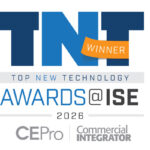With 27 employees, however, the type of scale Phillips describes is difficult to achieve. So like a lot of small- to medium-sized firms, Casaplex is wrestling with growth strategies. CEO Derek Goldstein acknowledges that being small has its downsides.
“With more structure you can accomplish bigger jobs. You can pull in more revenue. You can therefore, in my mind, invest in what I’m passionate about, which is the advancement of R&D and innovation.”
There is a path to success for small firms, according to NSCA’s Wilson, but it’s not the path most are currently taking. In a CI column predicting what the industry will be like in 2021, he wrote that there will still be many successful small companies.
PHOTOS: Inside the 2017 CI State of the Industry Report
“To survive, these companies will need to be great at one or two things (and stay focused on them). With the ability to assemble teams of experts focused on each technology sector and loyal clients that value single-point-of-contact relationships, large integrators will excel on many levels. In both cases, however, dedicated clients that value service over price will be an absolute requirement.”
Is Your Business Prepared for 2017?
NSCA’s Chuck Wilson and CI‘s Tom LeBlanc crunch industry survey results, identify where the industry stands, lay out imposing challenges and lay out strategies for success in 2017 and beyond during the 7th Annual Integration Business Outlook Presented by CI & NSCA.
That, in essence, is the “niche” part that Phillips references. We already know all-to-well what the “get out” part means.
Fighting the Good Fight
One reason so many firms are exploring exit as opposed to growth strategies is that the aforementioned path to success has a lot of pitfalls. Based on how traditional integration firms are structured it’s easy to see how today’s market demands can sink them.
Flip that around, however, and it’s easy to see how well-positioned firms are turning each pitfall into an opportunity.
Take managed services, for example. Only about 40 percent say their firm earns more than 5 percent of their revenue through any kind of contracted service.
A quick glance at what some of the top-performing firms reported in the 2016 CI Industry Leaders coverage for percentage of revenue under contract and it’s easy to see a trend — Whitlock at 50 percent; Yorktel at 50 percent; Advanced AV at 25 percent; AVI Systems and Verrex at 20 percent; Spinitar at 17 percent; Red Thread and Human Circuit at 15 percent; AVI-SPL at 13 percent.
Nearly a third of survey respondents are going beyond service contracts and have sold managed services within the past year.
Nearly a third of survey respondents are going beyond service contracts and have sold managed services within the past year. That’s a good sign for an industry that has struggled not only to make the business transition to selling managed services versus hardware but one that can’t even figure out what managed services to sell.
Asked what types of managed services they’re selling to customers, 44 survey takers typed in responses. Managed video conferencing services and onsite staffing were cited most often.
Count Genesis Integration among those integrators offering cloud-based video conferencing as a managed service to its customers. Also count the Edmonton, Alb.-based firm among those that had a difficult time making the transition away from reliance on hardware sales.
There were a couple of turning points for Genesis president Kelly McCarthy, who is also NSCA president. He fully committed to the transition to service-based sales when he realized “that a service contract simply maintains the original [system] configuration intent.”
In other words, the traditional integrator grew to see that contracts would allow Genesis to stay close to installed systems, protecting the customer’s investment and the firm’s reputation.
The other turning point was hiring from outside the industry an employee for whom managed service wasn’t a foreign concept. It was he who brought the idea for a video conferencing-as-a-service platform that drastically altered the company’s course.
Many traditional integration firms like Genesis are done talking about transitioning to managed services. They’re digging into the weeds and actually doing it, according to NSCA’s Wilson.
Continue on to Page 4>>













